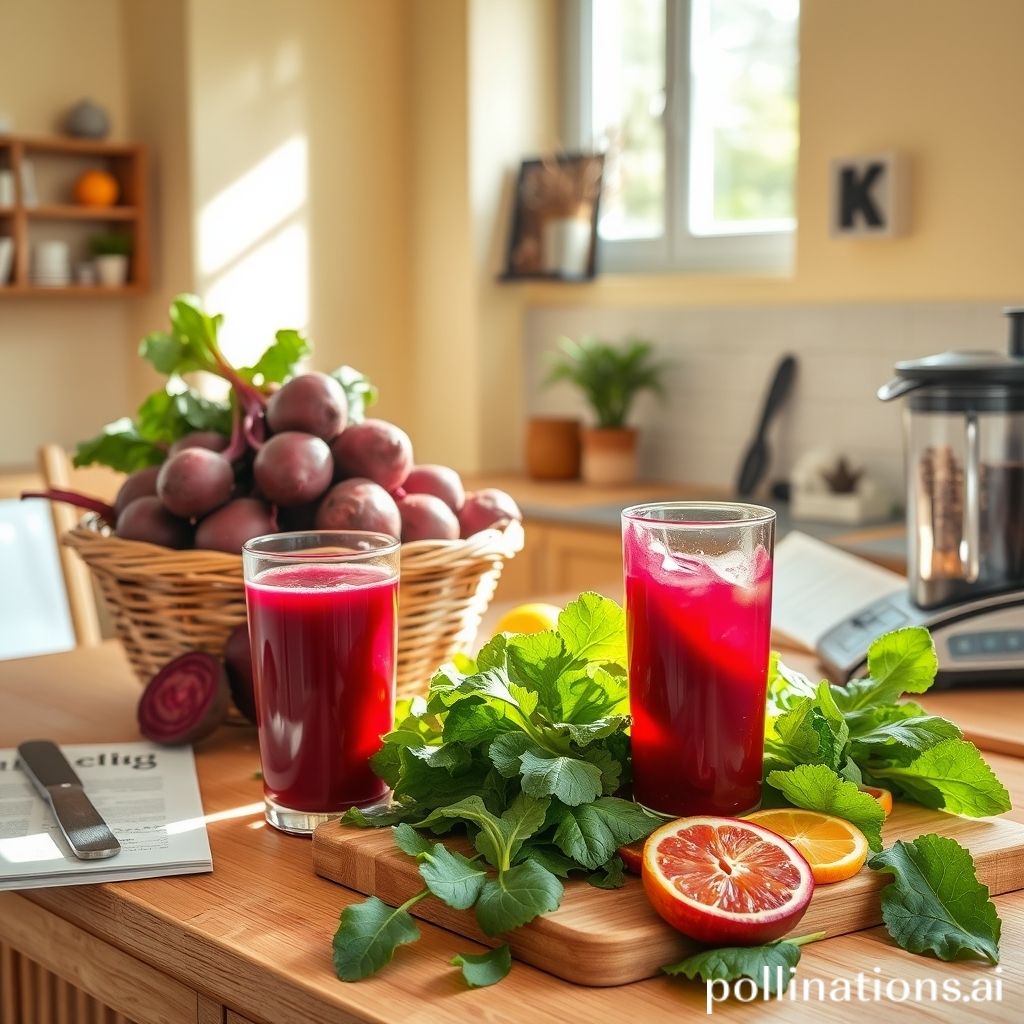What Happens If I Drink Beetroot Juice For One Month?
Beetroot juice has gained popularity as a potential health booster, with many curious about the effects of consuming it regularly for a month. People are seeking information on the potential benefits it can offer, such as improvements in blood pressure, athletic performance, digestion, and overall well-being.
The curiosity stems from the belief that incorporating this daily habit into their routine may lead to positive changes in their health. In order to shed light on the matter, it is important to explore the impact of drinking beetroot juice for an extended period of time. By examining the potential benefits and effects, we can gain a better understanding of the potential advantages this vibrant red drink may bring.

Table of Contents
Potential Benefits of Drinking Beetroot Juice
1. Lowering Blood Pressure and Improving Cardiovascular Health
Research has shown that regularly consuming beetroot juice can lower blood pressure. This is because beetroot juice contains high levels of nitrates, which are converted into nitric oxide in the body. Nitric oxide helps relax and dilate blood vessels, leading to reduced blood pressure. Several studies have proven the effectiveness of beetroot juice in lowering both systolic and diastolic blood pressure levels. This can be particularly beneficial for individuals with hypertension or those at risk of cardiovascular diseases.
2. Enhancing Athletic Performance and Stamina
Athletes are increasingly using beetroot juice to improve their performance and stamina. The nitrates in beetroot juice enhance oxygen utilization and increase endurance during physical activity. Studies have shown that consuming beetroot juice before exercise can improve time-to-exhaustion, allowing athletes to train for longer periods without fatigue. Additionally, beetroot juice may also improve muscle efficiency and reduce the oxygen cost of exercise, further enhancing athletic performance.
3. Promoting Digestion and Gut Health
Beetroot juice is rich in dietary fiber and antioxidants, making it beneficial for digestion and gut health. The fiber content promotes regular bowel movements and prevents constipation. Additionally, beetroot juice contains betaine, a compound that stimulates the production of stomach acid, aiding in digestion. The antioxidants in beetroot juice also reduce inflammation in the gut and support a healthy gut microbiome, contributing to overall digestive health.
4. Boosting Overall Well-being and Energy Levels
Regular consumption of beetroot juice positively impacts overall well-being and energy levels. The high nitrate content in beetroot juice improves blood flow and oxygen delivery throughout the body, resulting in increased energy levels. Additionally, beetroot juice contains vitamins, minerals, and antioxidants that support various bodily functions and contribute to overall vitality. Some individuals have reported an improvement in mood and mental well-being after incorporating beetroot juice into their daily routine.
Expert Tips: Regularly drinking beetroot juice can lower blood pressure, enhance athletic performance, promote digestion, and boost overall well-being.Nutritional Profile of Beetroot Juice
1. High in Essential Nutrients and Antioxidants
Beetroot juice is rich in essential nutrients and antioxidants, which are beneficial for your health. Regular consumption of beetroot juice for a month can significantly improve your overall well-being. Some key nutrients found in beetroot juice are:
| Nutrient | Amount per Serving |
|---|---|
| Vitamin C | Provides 15% of the recommended daily intake |
| Folate | Provides 20% of the recommended daily intake |
| Potassium | Provides 9% of the recommended daily intake |
| Manganese | Provides 8% of the recommended daily intake |
Along with these nutrients, beetroot juice is also high in antioxidants like betalains, known for their anti-inflammatory and detoxifying properties. These antioxidants help protect your cells from damage caused by harmful free radicals.
2. Low in Calories and Fat
If you are conscious of your calorie and fat intake, beetroot juice is a great choice. It is low in calories and virtually fat-free, making it a healthy addition to your diet. A 100ml serving of beetroot juice contains approximately:
- Calories: 43
- Total Fat: 0g
- Saturated Fat: 0g
- Trans Fat: 0g
- Cholesterol: 0mg
- Sodium: 78mg
- Total Carbohydrate: 10g
- Dietary Fiber: 1g
- Sugars: 9g
- Protein: 2g
The low-calorie and low-fat content of beetroot juice make it an ideal choice for individuals looking to maintain a healthy weight or manage their cholesterol levels.
How to Incorporate Beetroot Juice into Your Daily Routine
1. Choosing the Right Beetroot Juice Variant
- Comparing fresh, bottled, and powdered beetroot juice options: Learn about the pros and cons of each variant, including convenience, nutrient content, and taste.
2. Recommended Daily Intake and Serving Suggestions
- Guidelines for consuming beetroot juice: Understand the ideal daily amount for maximum benefits and how to adjust it based on individual needs.
When incorporating beetroot juice into your daily routine, it’s important to choose the right variant that suits your preferences and lifestyle. There are three common options available: fresh, bottled, and powdered beetroot juice.
Comparing fresh, bottled, and powdered beetroot juice options: Each variant has its advantages and considerations. Fresh beetroot juice is made directly from raw beets, resulting in a high nutrient content and superior taste. It may have a more significant health impact. Bottled beetroot juice offers convenience as it is readily available in stores. Although it may undergo pasteurization, which can reduce some nutrient levels, it still retains benefits. Powdered beetroot juice is a convenient option for those on the go and can be easily mixed with water or other beverages. Conversely, it may have a slightly lower nutrient content compared to fresh or bottled options.
Guidelines for consuming beetroot juice: It is recommended to start with a small serving and gradually increase the amount over time. The ideal daily intake is around 250-500ml, depending on factors like age, health condition, and personal goals. Conversely, individuals with existing health conditions or taking medications should consult their healthcare provider for personalized recommendations. To incorporate beetroot juice into your daily routine, consider consuming it as a standalone drink, mixing it with other juices, or adding it to smoothies. Additionally, you can experiment with incorporating beetroot juice into various recipes like salads or dressings to diversify your intake.

What Happens If I Drink Beetroot Juice For One Month?
Possible Side Effects and Precautions
Meanwhile drinking beetroot juice can have numerous health benefits, it is important to be aware of potential side effects and take necessary precautions.
1. Pink Urine and Stool Discoloration
One common side effect of consuming beetroot juice is the discoloration of urine and stool. This may cause temporary alarm, but it is completely harmless. The vibrant red pigment in beets, called betacyanin, is responsible for this effect. It is not completely absorbed during digestion and is excreted, resulting in pink or reddish urine and stool. This discoloration usually subsides within a few days after discontinuing beetroot juice consumption.
2. Interaction with Medications and Potential Allergic Reactions
Beetroot juice contains high levels of nitrates, which can interact with certain medications, such as blood pressure medications or erectile dysfunction drugs like Viagra. It is essential to consult a healthcare professional before incorporating beetroot juice into your daily routine, especially if you are taking any medication that may be affected by the nitrates.
Additionally, some individuals may be allergic to beets or have a sensitivity to them. Allergic reactions can range from mild to severe and may include symptoms like itching, hives, swelling, or difficulty breathing. If you experience any allergic reactions after consuming beetroot juice, it is crucial to seek immediate medical attention.
It is always recommended to start with small quantities of beetroot juice and gradually increase the intake, monitoring for any adverse effects. If you have any underlying health conditions or concerns, consulting a healthcare professional is advisable to ensure beetroot juice is suitable for you.
| Possible Side Effects | Precautions |
|---|---|
| Pink Urine and Stool Discoloration | Temporary effect, subsides within a few days |
| Interaction with Medications and Potential Allergic Reactions | Consult a healthcare professional, especially if taking medication affected by nitrates |
Personal Experiences and Testimonials
1. Real-life Stories of Individuals Who Have Incorporated Beetroot Juice into Their Routine
Many people have started drinking beetroot juice regularly and have seen positive changes in their health. These personal stories show how incorporating beetroot juice into your daily routine can be beneficial.
For example, John began drinking beetroot juice every morning for a month to help with his high blood pressure. After a month of consistent consumption, he noticed a significant decrease in his blood pressure readings. His doctor was surprised and encouraged him to continue with this healthy habit.
Sarah, an athlete, decided to include beetroot juice in her pre-workout routine after hearing about its potential benefits for athletic performance. She noticed that her endurance and stamina improved significantly during intense workouts. Sarah believes that beetroot juice played a crucial role in enhancing her performance and aiding in recovery.
Beetroot juice has also been found to have positive effects on digestion. Mary, who had occasional digestive issues, found that regular consumption of beetroot juice helped improve her gut health. She experienced less bloating and discomfort, which she attributes to the natural detoxifying properties of beetroot.
These real-life stories highlight the potential benefits of incorporating beetroot juice into your daily routine. During individual experiences may vary, these testimonials provide insights into the positive effects that beetroot juice can have on blood pressure, athletic performance, digestion, and overall well-being.
Conclusion
Regularly consuming beetroot juice for a month can have several potential benefits and effects on overall health. This daily habit has been associated with improvements in blood pressure, athletic performance, digestion, and overall well-being.
Considering the potential positive impact, it is worth considering adding beetroot juice to your diet as a simple and natural way to enhance your health and well-being. So why not give it a try and experience the potential benefits for yourself?
Faq about Drinking Beetroot Juice for One Month
FAQ 1: Can beetroot juice lower blood pressure immediately?
Beetroot juice has been shown to have a positive impact on blood pressure. Its high nitrate content helps dilate blood vessels, leading to lower blood pressure levels. Although, the effects may not be immediate and can vary depending on individual factors such as overall health and lifestyle.
FAQ 2: Is it safe to consume beetroot juice every day?
In general, drinking beetroot juice every day is considered safe for most people. Although, it is important to note that excessive consumption may lead to some side effects such as temporary discoloration of urine and stools. It is recommended to consult with a healthcare professional before making significant changes to your diet.
FAQ 3: Can beetroot juice enhance athletic performance for non-athletes?
Beetroot juice has gained popularity as a potential aid in enhancing athletic performance. The high nitrate content in beetroot juice may improve oxygen delivery to muscles, resulting in increased endurance and overall performance. In the course of it can benefit non-athletes as well, individual response may vary.
FAQ 4: Are there any alternatives to beetroot juice for the same benefits?
Yes, there are alternative sources of nitrates that can provide similar benefits to beetroot juice. Examples include leafy greens like spinach and arugula, as well as other vegetables like celery and radishes. Incorporating these foods into your diet can help achieve the same benefits as beetroot juice.
FAQ 5: Can beetroot juice cause any serious side effects?
In the course of beetroot juice is generally safe for consumption, it may cause some minor side effects such as an upset stomach or diarrhea in some individuals. Additionally, beetroot juice has a high sugar content, so individuals with diabetes or those watching their sugar intake should consume it in moderation. It is always recommended to consult with a healthcare professional before making any significant dietary changes.
Read Similar Post:
1. Can Consuming Beet Juice Lead to Stomach Upset? Find Out Now!
2. Exploring Beetroot: Understanding Potential Side Effects and Interactions

